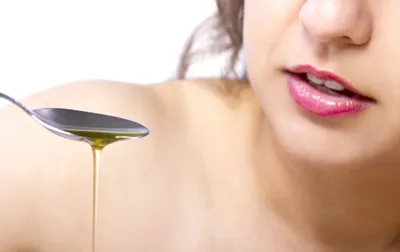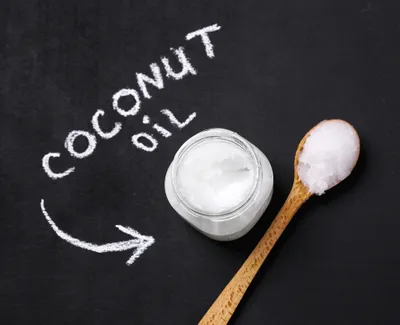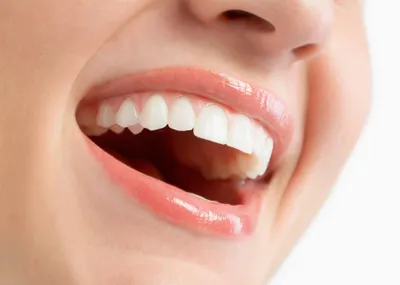As the natural health and wellness movement rolls on full steam ahead, many people are looking for alternatives to traditional methods of personal care. There is a lot of controversy around the ingredients and effectiveness of commercial toothpaste and as people are starting to understand the impacts of ingredients like sodium lauryl sulfate, hydrated silica, fluoride and propylene glycol, they’re turning to some old-school methods of cleaning their teeth.
You may have heard the term “oil pulling” come up recently, but unless you’ve tried it for yourself, chances are you’re not even sure what this technique really means. If you’re interested in trying oil pulling for the first time or even just curious about alternative health, you’re in luck because today I’m going to cover the basics and benefits of the technique known as oil pulling…
1. What is Oil Pulling?
Oil pulling is not some new wave health practice. It’s actually an ancient Ayurvedic medicinal practice that dates back over 3,000 years. It’s a process where you swish a small amount of coconut oil around in your mouth in order to kill unfriendly bacteria, keeping your whole mouth clean and fresh.
The term ‘oil pulling’ refers to the way you work the oil in your mouth by pulling, pushing, and sucking it through your teeth to get into every nook and cranny where bacteria like to hide. The theory behind the practice is that the fatty molecules in the oil attract and bond with the fatty membrane that surrounds each microorganism cell. Once you spit out the oil after it has done it’s job, the collected bacteria goes out with it.
2. History of Oil Pulling
As mentioned above, oil pulling is an ancient practice traditional of Ayurvedic medicine, a system of medicine with roots in the Indian subcontinent. We know it dates back well over 3,000 years because it is referenced in the Charaka Samhita, a Sanskrit text written on traditional Indian medicine, where the practice is referred to as Kavala Gandusha or Kavala Graha.
The text claims that oil pulling can cure about 30 systemic diseases including chronic headaches, migraines, diabetes and several skin conditions. While this ancient practice is fairly simple and straight forward, there are many misconceptions about how it’s done.
3. How To Pull
Now that you’re familiar with the history and theoretical practice of oil pulling, let’s get into the specific of how this practice is really done. First, the oil you use: several types of oils have been used for oil pulling including sesame oil and sunflower oil, but the most recommended type is coconut oil for a few reasons. Half of the fat in coconut oil is composed of lauric acid, which has strong antibacterial and antimicrobial properties and inhibits the growth of the primary bacteria responsible for causing tooth decay. It is recommended that you oil pull on an empty stomach, which makes first thing in the morning an ideal time to do it.
To pull, put a tablespoon of coconut oil in your mouth and slowly start to swish, swirl and ‘pull’ it around your mouth and through your teeth. Set a timer and continue to do this for 20 minutes before spitting it into a trash bin and thoroughly rinsing out your mouth. As the oil gets swished around it becomes cloudy and white and becomes a thinner consistency as it mixes with saliva. Make sure you do not swallow the oil as it will contain all the toxins and bacteria you’ve gotten rid of.
4. Benefits of Oil Pulling: Part 1
There are so many supposed benefits of oil pulling, as I mentioned perviously, the ancient Ayurvedic medicinal text lists over 30 illness and diseases that can be treated with this technique, but it’s important to not that none of these benefits have been scientifically proven. Still, there are many first hand reports of success from people who’ve taken up this practice.
One of the cosmetic benefits of oil pulling is that it claims to whiten teeth, this is because the oil’s antiviral and antibacterial properties remove stain-causing bacteria making your teeth look pearly white over time. It’s also said that oil pulling can increase energy levels by reducing the work load of the immune system, thanks to the removal of bacteria in the mouth. Oil pulling also claims to have a detoxifying effect on the body, by removing bacteria in the mouth, inflammation is reduced which reduces the occurrence of disease and illness.
5. Oil Pulling Benefits: Part 2
Continuing on in the beneficial claims of this practice, oil pulling is said to reduce chronic headaches and migraines. This is supposedly because eliminating harmful bacteria from the body reduces the toxic stress load on the body when helps reduce the occurrence of headaches and migraines.
The benefits of the oil pulling practice are even said to extend to the skin, as conditions such as acne, eczema, psoriasis, rashes and other skin issues can be managed and even drastically reduced. One definite benefit of oil pulling is that it does help promote better oral hygiene as it does effectively reduce the bacteria levels present in the mouth. This can reduce tooth decay, freshen breath and help cure gingivitis caused by plaque build up.
6. Controversy
As with most alternative health practices, there is a fair amount of controversy that surrounds the process and claims of oil pulling. Part of the skepticism is that none of the health benefits that are thrown around by advocates are actually backed by scientific evidence. Some dentists are in favor of the practice, but others say they see no significant changes in the oral health of patients who practice this technique.
There can also be some negative side effects if the technique is not practiced properly including dry mouth, muscular stiffness, excessive thirst and loss of sensation or taste in the mouth. It’s incredibly important to ensure you don’t swallow any of the oil and rinse your mouth thoroughly after oil pulling to ensure you don’t ingest the toxic bacteria that has been collected. You should also avoid spitting the used oil down the drain because it can build up and eventually block your pipes.
7. Conclusions
Ultimately the decision to give oil pulling a try is entirely up to you. There is little harm in giving it a try, but speaking from experience there are a few things to keep in mind: primarily, the fact that oil pulling takes time and dedication. It can take months of routine daily swishing before you begin to see or feel any improvements, and of course there could be no improvements seen at all.
It can be difficult for some people to keep swishing and pulling the oil for the recommended 20 minutes, but if jaw fatigue occurs, you probably need to slow down. The other issue can be volume, as the oil collects saliva, it starts to increase in volume. Personally by the end of the 20 minutes I found the volume difficult to handle, so if this happens to you, try reducing the amount of oil that you start with.










